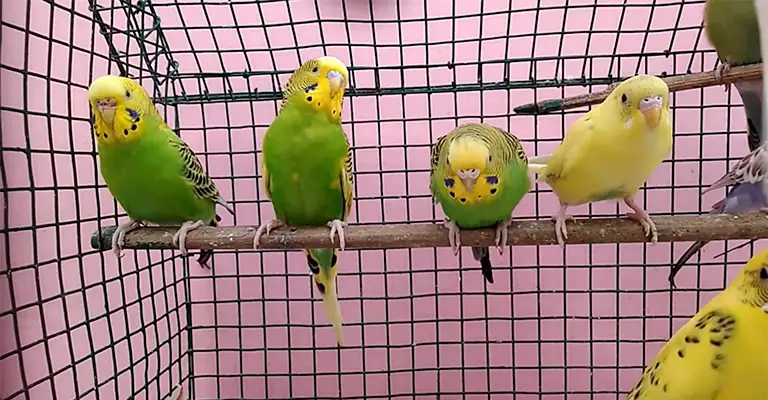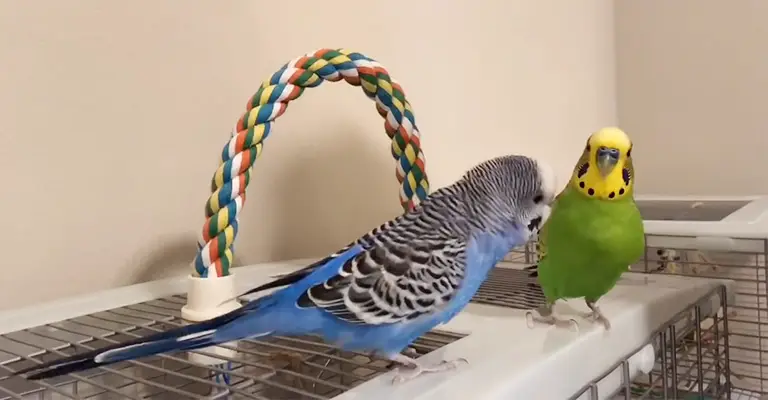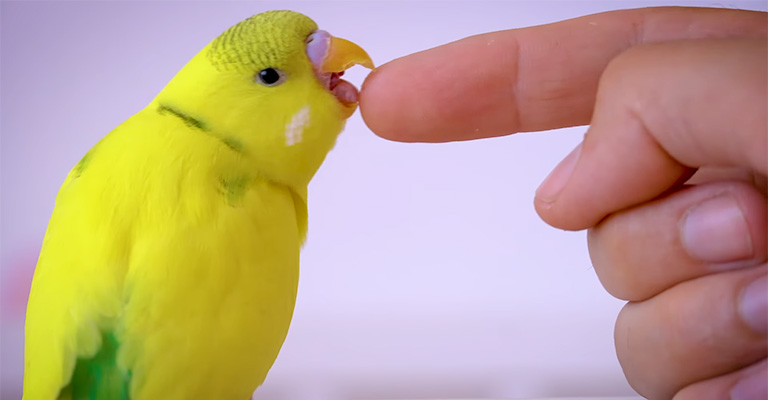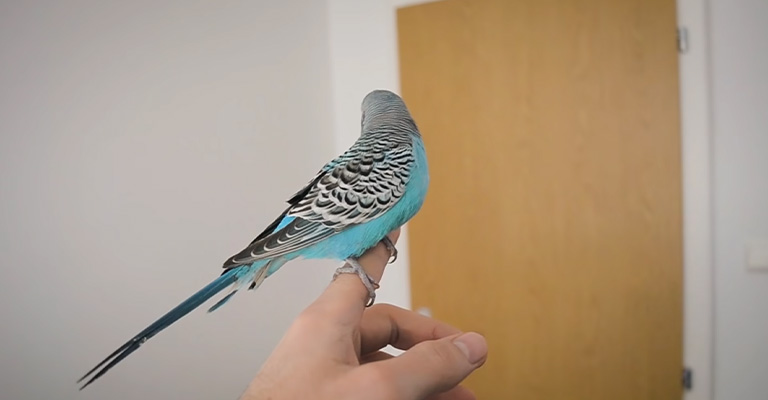Within the intricate realm of avian behaviour, the interactions between different generations of budgies offer a captivating glimpse into their social dynamics.
The relationships between older and younger budgies are a testament to the complexity of avian society, where guidance, protection, and shared experiences shape the development of the younger members.
As older budgies interact with their fledgling counterparts, they exhibit a range of behaviours that contribute to the socialization and adaptation of the younger birds within the flock.
Exploring how do older budgies treat young budgies unveils a world of nurturing, teaching, and camaraderie that showcases the innate wisdom of the older budgies and the vulnerability of the young.

How Do Older Budgies Treat Young Budgies?
Older budgies can treat young budgies in different ways depending on their personality, temperament, and relationship.
Here are some possible situations that can occur between older and younger budgies:
Feeding and Nurturing
Older budgies often play a nurturing role towards younger ones by demonstrating feeding behaviours. They might regurgitate food to feed the younger budgies, especially if the younger ones are still learning to eat on their own.
Protection and Guidance
Older budgies can provide protection and guidance to younger ones. They may show them where to find food and water, and they might help keep them safe from potential threats in the environment.
Social Integration
Older budgies help integrate younger ones into the flock. They might invite them to perch nearby, encouraging social interactions and aiding in the younger birds’ social development.
Teaching Manners

Older budgies can indirectly teach young ones about social norms within the flock. They might exhibit behaviours that the younger ones learn from, such as grooming or preening.
Demonstrating Bathing
Budgies often enjoy bathing. Older budgies might show young ones how to splash and bathe, encouraging them to learn these essential hygiene behaviours.
Preventing Aggression
Older budgies can intervene if a young budgie inadvertently enters another bird’s territory. They might help prevent aggression by mediating conflicts.
Building Comfort
Young budgies might feel more at ease around older, experienced flock members. The presence of older budgies can provide a sense of security and reduce stress.
Comfort during Rest
Older budgies might allow younger ones to rest close to them. This proximity offers warmth and reassurance, replicating the comfort of being close to their parents in the wild.
Encouraging Exploration
Older budgies might lead by example, exploring new toys, perches, and parts of the cage. This can encourage younger ones to be curious and discover their environment.
The interactions between older and younger budgies contribute to the overall social dynamics of the flock.
These interactions help the younger ones learn essential skills, adapt to their environment, and develop socially within the budgie community.
How Can I Treat My Older Budgies To Treat Good With The Young Budgies?

If you want your older budgies to treat your young budgies well, you need to train them properly and patiently.
Here are some training methods that you can try:
Gradual Introductions
When introducing older budgies to younger ones, do so gradually. Place their cages side by side, allowing them to observe each other without direct contact. This helps both groups get accustomed to the presence of the other.
Supervised Interactions
Begin with supervised interactions in a neutral space. Keep a close eye on their behaviour to ensure there are no signs of aggression or stress. Gradually increase the duration of these supervised sessions.
Positive Reinforcement
Use positive reinforcement to reward good behaviour. When both groups of budgies interact calmly and without aggression, offer treats or praise to encourage their positive interactions.
Shared Activities
Engage both groups in shared activities, such as eating or playing. This fosters a sense of camaraderie and helps them associate each other with enjoyable experiences.
Neutral Territory
If you’re introducing them into the same cage, clean it thoroughly to eliminate territorial scents. This creates a neutral environment where neither group feels the need to establish dominance.
Multiple Food and Water Stations
Provide multiple food and water stations to prevent competition and ensure that all budgies have easy access to essential resources.
Respect Personal Space
Respect the personal space of each group. Older budgies might need their own areas to retreat to, especially if they feel overwhelmed by the younger, more energetic ones.
Environmental Enrichment
Offer a variety of toys, perches, and activities in the cage to keep all budgies mentally stimulated and occupied. This can prevent boredom-related conflicts.
Patience and Monitoring
Building positive relationships takes time. Be patient and monitor their interactions closely. If any signs of aggression or stress arise, separate them and try again later.
Creating a harmonious environment between older and younger budgies involves fostering a sense of security and positive association.
Gradual introductions, positive reinforcement, and careful observation are key to encouraging them to treat each other well and develop strong bonds within the flock.
Why Do Older Budgies Treat Badly With Young Budgies?

Older budgies may treat young budgies badly for various reasons, such as:
Territoriality
Older budgies may be territorial and defensive of their space, food, toys, perches, or mates. They may see young budgies as intruders or competitors and try to chase them away or assert their dominance over them.
They may also mark their territory by biting, scratching, or pecking the young budgies or their belongings.
Jealousy
Older budgies may be jealous and resentful of the attention, affection, or favouritism that the young budgies receive from their owner or other birds.
They may feel neglected or abandoned and try to sabotage or interfere with the relationship between the young budgies and their owner or other birds. They may also act out or misbehave to get attention or revenge.
Fear
Older budgies may be fearful and anxious about the changes or challenges that the young budgies bring to their environment or routine.
They may feel threatened or insecure by the presence, behaviour, or abilities of the young budgies and try to avoid or escape from them.
They may also become aggressive or defensive to protect themselves or their owner from the young budgies.
Boredom
Older budgies may be bored and restless of their monotonous or dull life and seek some excitement or stimulation by picking on the young budgies.
They may see the young budgies as toys or targets and try to play with them or tease them.
They may also enjoy the reaction or response that they get from the young budgies or their owner.
Curiosity
Older budgies may be curious and interested in the new or different features or characteristics of the young budgies, such as their size, colour, shape, sound, or smell.
They may want to explore or investigate them by touching, tasting, smelling, or hearing them. They may also want to test or challenge them by provoking, nudging, or pushing them.
Hormones
Older budgies may be hormonal and moody due to their breeding season or cycle. They may become more aggressive, territorial, possessive, or irritable and try to mate with or fight with the young budgies.
They may also become more vocal, restless, or destructive and try to attract or impress the young budgies.
Personality
Older budgies may have different personalities or temperaments that clash with those of the young budgies.
They may be more dominant, assertive, or confident and try to control or boss around the young budgies.
They may also be more shy, submissive, or timid and try to avoid or hide from the young budgies.
Habits
Older budgies may have different habits or preferences that conflict with those of the young budgies.
They may have different schedules, routines, or patterns and try to impose or disrupt those of the young budgies.
They may also have different tastes, likes, or dislikes and try to share or reject those of the young budgies.
Health
Older budgies may have health problems or diseases that affect their mood or behaviour towards the young budgies.
They may be in pain, discomfort, or distress and try to cope or relieve themselves by biting, pecking, or scratching the young budgies.
They may also be contagious, infectious, or parasitic and try to spread or transmit their condition to the young budgies.
FAQ
Older budgies often display nurturing behaviours like feeding and protecting the young ones. They guide them in finding food, teach social norms, and provide companionship.
Yes, older budgies might regurgitate food to feed the younger ones, especially if they’re still learning to eat independently.
Absolutely; older budgies set examples for grooming, preening, and social interactions, helping young ones learn proper behaviours within the flock.
Older budgies watch out for potential dangers and might guide young ones away from risky situations. Their presence provides a sense of safety.
Yes, older budgies allow young ones to rest near them, providing warmth and reassurance akin to parental care, and promoting a sense of comfort and security.
Conclusion
In the enchanting tapestry of avian life, the interactions between older and young budgies exemplify the intricate web of connections that bind a flock together.
The guidance, protection, and shared experiences that older budgies offer to their younger counterparts underscore the depth of social dynamics within the avian world.
As we conclude our exploration, we recognize the significance of these interactions in shaping the development and cohesion of the flock.
The lessons learned, the bonds formed, and the nurturing exchanges all contribute to the complex yet beautifully harmonious existence of budgies across generations.
Through their actions, older budgies become mentors, guardians, and companions, fostering a legacy of unity that transcends age and emphasizes the strength of collective survival in the avian realm.